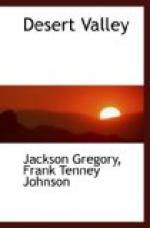He was making discoveries hand over fist; perhaps therein lay a sufficient reason why the man of science in him was fascinated. True, those discoveries which he made were new only to him; yet one might say the same of America and Columbus. For one thing, it dawned on him that here was a new and excellent technical vocabulary; he stored away in his brain strange words as a squirrel sticks nuts and acorns into a hole. Hondo, tapaderos, bad hombre, tecolote, bronco, maverick, side-winder—rapaciously he seized upon them as bits of the argot of fairyland. He watched the expert roll the brown tube of a cigarette and yearned for the skill; he observed tricks in riding, and there was within him the compelling urge to ride like that; not a trifle escaped his shark-eyes, be it the way the men combed their hair, mounted their horses, or dragged their spurs. To-night and with unhidden elation he accepted Barbee’s invitation to ‘set in and roll the bones’ with them. ‘Roll the bones!’ When some day he went back home, the owner of the ‘greatest little mine this side of the Rockies,’ he’d work that off on his old chum, Professor Anstruther. He drew up his chair to the table, piled a jumble of coins in front of him and took into his hands the enticing cubes.
He did not think of it as gambling; he had never gambled, had never wanted to. But he was all alive to join in the amusements of his new friends, to be like them. After all, he was putting up as sorts of markers a few five and ten-cent pieces with an occasional quarter or half-dollar, and to him money had never had much significance. The game was the thing and he found in it from the first a keen mathematical interest. There were five dice; each dice with its six surfaces had six different numbers. While he beamed into the veiled eyes of the old Mexican he was figuring upon the various combinations possible and the likelihood, the theory of chances, of a six or an ace upon the second throw. From the jump the game fascinated him; it is to be questioned, however, if ever before a man knew just the sort of fascination which enthralled him. No matter who won or lost, when the rolling cubes behaved in conformity with the mathematical laws, he fairly sparkled. And in the end he lost only six or seven dollars and did not in the least realize that he had lost a cent. When at last he left to go to bed, all of the eyes in the room followed him. They were puzzled eyes.
‘The old boy’s all right,’ said one man. It was Tod Barstow, an old hand. And he added, nodding, ‘He’s a damn good loser.’
Barbee chuckled and pocketed his small winnings.
‘That’s what I’m playing him for, Toddy,’ he admitted with his cheerful grin.
In the end the Longstreets went from Desert Valley straight on to the nearest town, that of Big Run, only a dozen miles still east of the ranch. The suggestion came from Longstreet himself, who had had a picturesque account of the settlement from Barbee.




